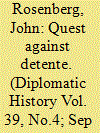|
|
|
Sort Order |
|
|
|
Items / Page
|
|
|
|
|
|
|
| Srl | Item |
| 1 |
ID:
160229


|
|
|
|
|
| Summary/Abstract |
During the first half of the 1970s, the European Community became a recognisable actor at the United Nations [UN]: The Community itself became a permanent observer, and it was customary for Community member-states to express common positions on most of the issues discussed within the organisation. It was a remarkable development for the Western European states—yet one not satisfactorily accounted for by the existing literature. The perspective adopted in this analysis highlights the connexions between the growing activity of the Community at the UN and the increasing co-ordination of its member-states even on matters falling outside the Community’s purview, as well as the connexions between the affirmation of the European Community at the UN and other major contemporary developments in European political integration. In this way, this analysis sheds light on some fundamental motives, features, and limits of Western European co-ordination on the international stage.
|
|
|
|
|
|
|
|
|
|
|
|
|
|
|
|
| 2 |
ID:
140748


|
|
|
|
|
| Summary/Abstract |
This article argues that the October War of 1973 between Egypt, Syria, and Israel had a profound impact on the right wing campaign against détente in the United States. It focuses on Eugene Rostow’s leading role in the anti-détente movement of the 1970s, revealing how Rostow, who had previously supported détente, interpreted the October War as a Soviet plot to destroy Israel and separate Europe from the United States. Henry Kissinger and Richard Nixon, he concluded, were deceiving the American people to maintain the “myth” of détente. Race profoundly influenced Rostow’s reasoning. He rendered Arab peoples irrational, emotional, and childlike, wholly under the control of Soviet leaders. Rostow launched what one historian has referred to as the “first head-on assault of détente,” through his leadership of the Coalition for a Democratic Majority and later his founding of the Committee on the Present Danger. While the article highlights the conflicting views between Rostow and Kissinger, it emphasizes that the two men shared a Cold War worldview.
|
|
|
|
|
|
|
|
|
|
|
|
|
|
|
|
|
|
|
|
|